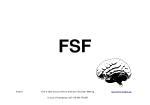
FREE SOFTWARE FOUNDATION THINKING OF PATENT RETALIATION CLAUSE: The Free Software Foundation says it is considering plans to introduce a patent retaliation clause into the next version of Richard Stallman's General Public Licence.
The Free Software Foundation (FSF) was established in 1985 to promote computer users' rights to use, study, copy, modify, and redistribute computer programs. The FSF promotes the development and use of free software through the GNU operating system. The GNU Project was launched in 1984 to develop a complete UNIX style operating system which is billed as "free software" (GNU is a recursive acronym for “GNU's Not UNIX”; it is pronounced “guh-noo.”) Variants of the GNU operating system, which use the kernel Linux, are now widely used, and though these systems are often referred to as “Linux”, they are more accurately called GNU/Linux systems.
In order to promote the development of the software, the Foundation is thinking about adding a clause in the General Public License that states that if a participant decides to enforce a patent against a co-developer, the participant could lose the right to use or distribute the free software product. Provisions for copyright enforcement are being considered as well.
Although the open-source community keeps trying to skirt around patents, I don't think this is going to do anything substantive to the perceived patent threats. If anything, the provision only protects GNU users only from themselves - anyone looking to take a shot at GNU with their patents isn't likely to come from the ranks of the FSF.
Wednesday, September 07, 2005
Subscribe to:
Post Comments (Atom)





But it is funnier than that. This license would change the terms of many pieces of GPL licensed code (see paragraph 9). I'm certainly not qualified to make any pronouncements, but this sounds as though the Free Software Foundation is leveraging its share of various software markets to prevent people from enforcing their patent rights. This sounds like an anti-trust concern.
So now Microsoft can sue the FSF for being a monopoly. I find the turn-about amusing.
David
I think the FSF could have some serious sway if it got litigous.
Say you're a cube jockey at MegaCo, and you need to write some quick code by five o'clock to implement a registry database. Oh, look, here's the code for gconf that does just this and is readily cut-and-pasteable. You beat rush hour traffic, and the boss has software to turn into object code, shrinkwrap, and vend.
Even if you didn't cut and paste code, you probably had a good look at some open source code for inspiration before implementing your own, and if some of the expressive elements of that code leaked over to your own work, you're infringing again.
The FSF will have an easy time initiating any copyright infringement case it darn well pleases to. Did the alleged copier have access to GPLed code? Yes. Is a program which does the same thing as GPLed code substantially similar? To a first pass, yes. This is already enough to keep MegaCo's legal team busy for a few million dollars while it tries to prove that the details of its code base differ sufficiently from the FSF's open base.
Gosh, why even go that far. MSFT has Linux boxes on its campus, as does any other sane computer company that is trying to stay abreast of the real world. Since Linux is GPLed, MSFT would potentially lose its license, and any download from any linux mirror going to the 207.46 domain [aka microsoft.com] would be grounds for a lawsuit.
If you sell closed-source server software (and aren't MSFT), then you need to make a Linux version, so if you are barred from the license you need to buy a test box for your software, then your company is screwed.
It's been a long time since things were black-and-white enough to say that there's the open-source team and the closed-source team, and now that most of the coding world lives in a shade of grey, an awful lot of companies stand to lose if cut off from all GPLed code.
[What this clause of the GPL would miss out on are our affectionately named patent trolls, who have no products and therefore live at the closed-source extreme. All the FSF has to defend against them is a whole lot of prior art.]
Post a Comment